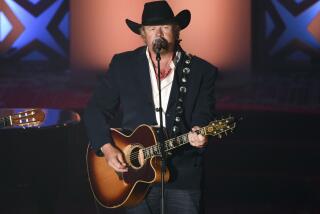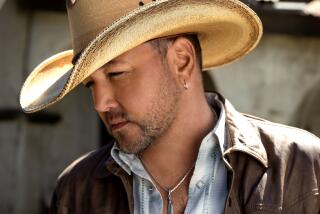POP MUSIC REVIEW : The Secret of Ketchum’s Country? It’s the Economy
- Share via
SAN JUAN CAPISTRANO — All those folks trying to hammer out a budget in Washington could have learned a thing or two about economy from Hal Ketchum’s tight, well-paced show at the Coach House Sunday night.
If the politicians are really serious about getting the economy rolling, they might consider putting Ketchum’s smile on $10 bills. Every time Ketchum flashed a grin, the crowd responded with so much enthusiasm you’d have thought the singer was tossing money at them.
And when it comes to trimming the fat, those in government could take a lesson from the way Ketchum derived maximum impact from a show that avoided extraneous instruments and unnecessary showmanship. Not a note, a word or a movement in Ketchum’s 1-hour, 35-minute early set was wasted.
Ketchum moved rapidly from song to song and made every gesture add to the effect of his music. His clench-jawed intensity and tightened fist during the opening number, “I Miss My Mary” from his 1991 debut album, “Past the Point of Rescue,” perfectly captured the churning emotions beneath the toughened exterior of the longshoreman in the song. A few numbers later, Ketchum’s lazy yodel on “Five O’Clock World” evoked the bittersweet sense of relief a working man feels when he returns home at the end of a stressful day.
Ketchum and his three-piece band, the Alibis, limited instrumentation to the bare bones combination of electric lead guitar and a rhythm section of acoustic guitar, bass and drums. No swirling synthesizers or pretty fiddle or mandolin licks sweetened the stark emotions of Ketchum’s lyrics. In fact, on one song, a new number called “Swing Low,” Ketchum dismissed the band and sang without accompaniment.
In contrast to the obviously choreographed dancing of so many of today’s country performers, Ketchum’s movements seemed spontaneous and designed not so much to entertain as to punctuate his songs. At times he would emphasize a note by swinging his guitar or kicking his leg. Frequently, Ketchum would move to the edge of the stage to make better contact with his fans. He generated near-pandemonium during the moments when the rhythm inspired him to a little understated hip swinging. Here again, Ketchum’s mere suggestion of a wiggle was as effective as all of Billy Ray Cyrus’ or Dwight Yoakam’s writhings.
Ketchum didn’t waste much time in extraneous conversation. He introduced most songs with a sentence or two. Every now and then, he did let his playful sense of humor show. “I want to try another new song,” he said in mid-set as he paused to tune his guitar, “and I thought I might play it in the same key as the rest of the band.” Another time, as he was being showered with wild applause for some simple gesture, Ketchum quipped, “When I went out for Mr. Congeniality, I had no idea.”
Ketchum’s unadorned approach made his elegant, to-the-point songwriting even more effective. Songs such as “Daddy’s Oldsmobile” from his second album, “Sure Love,” use telling details (he describes his father crushing out a cigarette as he mutters, “Don’t cry honey; we ain’t beat yet”) to underscore emotions. Although Ketchum’s songs are full of clever wordplay--such as in the title of his current hit single, “Hearts Are Gonna Roll”-- it never distracted from the point.
During his 20-song early set, Ketchum touched on styles that ranged from the Western swing of “Till the Coast is Clear” to the pure pop of “Five O’Clock World” to the driving rhythm and blues of a new number, “I Ain’t Leaving Your Love.” Ketchum’s spare approach tended to erase the boundaries between genres as each number became a direct communication between Ketchum and his audience.
Ketchum’s song selections were divided almost equally between old and new material. His performance of the one cover song in his set, a stunning version of Johnny Cash’s “Folsom Prison Blues,” emphasized the pounding locomotive-like rhythm of the number in a way that train-lover Cash would surely appreciate.
Veteran character actor Ronny Cox, known for his roles in “Beverly Hills Cop” and “Total Recall,” opened the show with a 30-minute acoustic set of songs from his eponymous new album. In contrast to Ketchum’s pared-down approach, Cox did almost as much talking as he did singing.
In his closing number, “The Night John Huston Died,” Cox’s personal tribute to his friend and idol, he not only explained in copious detail his relationship with the great actor-director, he also stopped to explain the Spanish lyrics in the song. Cox’s personal approach seemed to strike a chord with the audience, and he was warmly received.
More to Read
The biggest entertainment stories
Get our big stories about Hollywood, film, television, music, arts, culture and more right in your inbox as soon as they publish.
You may occasionally receive promotional content from the Los Angeles Times.










